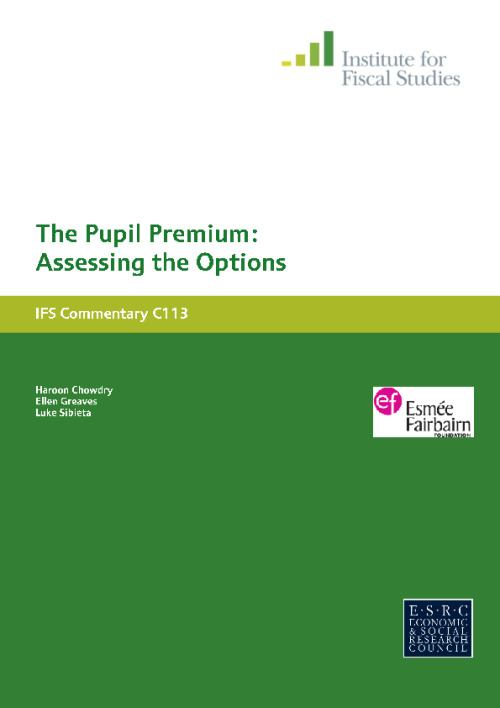Downloads

comm113.pdf
PDF | 1.22 MB
<p><p>Both the Conservatives and the Liberal Democrats have proposed introducing a 'pupil premium' in England, with the aim of narrowing the educational achievement gap between rich and poor pupils by attaching greater school funding to those from disadvantaged backgrounds.</p><p>In "The pupil premium: assessing the options", IFS researchers assess the rationale for a pupil premium and offer an empirical analysis of how such a scheme might operate in practice and affect school finances. We are very grateful to Esmée Fairbairn Foundation for financing this work.</p> </p>
Authors

Research Fellow
Luke is a Research Fellow at the IFS and his general research interests include education policy, political economy and poverty and inequality.

Haroon Chowdry

Research Fellow University of Bristol
Ellen, who was a Senior Research Economist at IFS and is now a Research Fellow, is a Max Weber Fellow at the European University Institute.
Report details
- DOI
- 10.1920/co.ifs.2010.0113
- Publisher
- IFS
Suggested citation
H, Chowdry and E, Greaves and L, Sibieta. (2010). The pupil premium: assessing the options. London: IFS. Available at: https://ifs.org.uk/publications/pupil-premium-assessing-options-0 (accessed: 2 May 2024).
More from IFS
Understand this issue

Public investment: what you need to know
25 April 2024

The £600 billion problem awaiting the next government
25 April 2024

Sure Start achieved its aims, then we threw it away
15 April 2024
Policy analysis

The short- and medium-term impacts of Sure Start on educational outcomes
9 April 2024

Sure Start greatly improved disadvantaged children’s GCSE results
9 April 2024

What you need to know about the new childcare entitlements
28 March 2024
Academic research

6th World Bank/IFS/ODI Public Finance Conference | Driving Progress: Public Finance and Structural Transformation

Willingness to pay for improved public education and public healthcare systems: the role of income mobility prospects
14 March 2024

Labour market inequality and the changing life cycle profile of male and female wages
15 April 2024